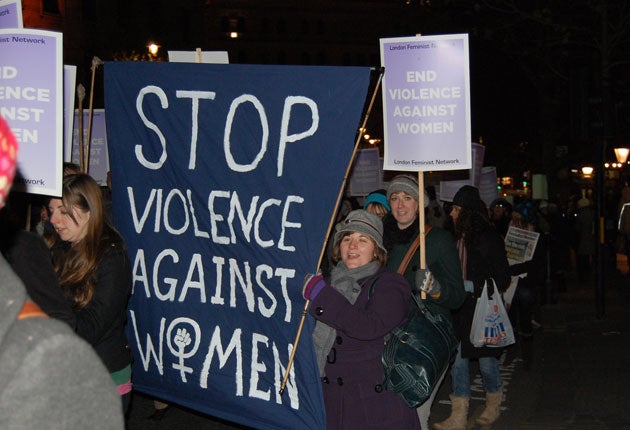The march of the new feminists
Women's groups are thriving for the first time in a decade as young Britons rediscover gender issues

Your support helps us to tell the story
From reproductive rights to climate change to Big Tech, The Independent is on the ground when the story is developing. Whether it's investigating the financials of Elon Musk's pro-Trump PAC or producing our latest documentary, 'The A Word', which shines a light on the American women fighting for reproductive rights, we know how important it is to parse out the facts from the messaging.
At such a critical moment in US history, we need reporters on the ground. Your donation allows us to keep sending journalists to speak to both sides of the story.
The Independent is trusted by Americans across the entire political spectrum. And unlike many other quality news outlets, we choose not to lock Americans out of our reporting and analysis with paywalls. We believe quality journalism should be available to everyone, paid for by those who can afford it.
Your support makes all the difference.They are the Topshop generation: young girls more used to partying than protesting; keener on women's looks than women's lib. But now they have had enough. A new wave of feminists, some still in their teens, are putting the struggle for women's rights back on the agenda for the first time in a decade.
The feminist resurgence has spawned a flurry of new blogs, magazines, books, societies, conferences and protest marches – and this time dungarees are out.
On university campuses, women's groups are thriving once more, while hundreds of women each month are joining new feminist networks in cities from Birmingham and Manchester to Glasgow and London.
The old-school Fawcett Society, which dates back to the suffragists, has seen its membership jump by 25 per cent in the past 12 months and the number of its newsletter subscribers double; while earlier this month, more than 2,000 women took to London's streets to "Reclaim the Night" from the men who make them unsafe. Similar marches have been held in cities all over the country. And websites such as The F-Word, started by Catherine Redfern eight years ago as a forum for contemporary feminism, is getting more than 110,000 hits a month.
Campaigners say the trigger for the new burst of activity is a growing frustration that women still lag men in all walks of life a century after the suffragettes began their fight. In the workplace, the boardroom and the home, not to mention the political system and in popular culture, women are still battling acute gender bias that means globally they earn less, despite working harder than men. According to Professor Richard H Robbins, women do two-thirds of the world's work, yet receive only 10 per cent of the world's income.
Activists also cite a growing "objectification" of women that has recently seen universities reintroduce beauty pageants and the number of lap-dancing clubs in the UK explode to 300 – not to mention the proliferation of lads' magazines such as Nuts and Zoo, which feminist groups such as Object are fighting to get banished to newsagents' top shelves.
Finn Mackay, who heads the London Feminist Network, said young women were leading the new movement "because they are the ones bearing the brunt of today's objectifying culture and they have stopped finding that amusing".
A new poll of feminists revealed that nearly half are under 25, with almost three-quarters of the 1,300 surveyed saying they started to identify with being a feminist while still in their teens.
Catherine Redfern, who conducted the survey for Reclaiming the F Word: The New Feminist Movement, which she is co-writing with Kristin Aune, said: "We want to tell people that feminism is still here, and is a growing, vibrant movement." Theirs is one of three books on feminism due out in the next few months, including Natasha Walter's Living Dolls: The Return of Sexism.
Kat Banyard, the Fawcett Society's campaigns director and author of The Equality Illusion, due out in March, said: "The mainstreaming of the sex industry has been the biggest catalyst [for the resurgence]. It's brought sex on to the high street. The bottom line is there is a need for feminist activism, despite the gains that have been made."
Campaigners such as Object's Anna van Heeswijk are already notching up victories. An amendment to the Police and Crime Bill was passed earlier this month that will help to halt the sex industry's proliferation on to the high street. "Next year could be the year that we reclaim the F-word for what it is, one of the world's most important movements for social justice," Ms van Heeswijk added.
Ellie Levenson
The Noughtie Girl's Guide to Feminism
Although not to everyone's tastes – ie, the chick-lit approach – the former comedian's take on lipstick feminism ended an 11-year feminist publishing drought this summer.
Natasha Walter
Living Dolls: The Return of Sexism
After arguing feminism shouldn't police women's clothes and sexual behaviour in her last book, she's back, worrying about the hypersexual culture round young girls.
Kat Banyard
The Equality Illusion
The title says it all: the Fawcett Society's campaigns officer rips apart the belief that feminism has achieved its aims – men and women are equal – and calls for more action.
Join our commenting forum
Join thought-provoking conversations, follow other Independent readers and see their replies
Comments